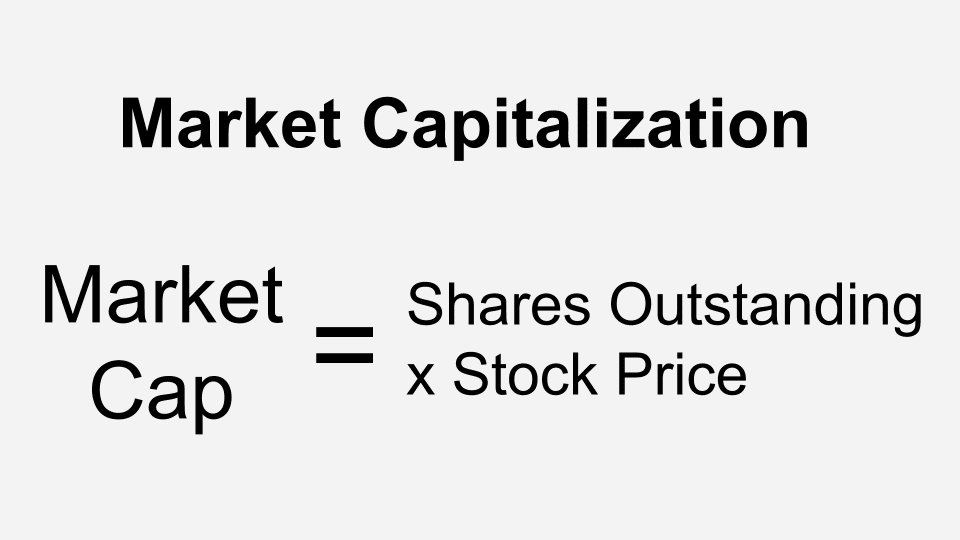Market Capitalization (Market Cap): Definition and Formula
Market capitalization, or market cap, is the combined value of all of a company's outstanding stock. It is an estimate of the total value of a company.
Formula: Market Capitalization = Outstanding Shares * Stock Price
Investors and others often use the market cap to determine a company's size, because it is a more convenient metric for this than revenue or earnings.
Generally speaking, a company with a higher market cap is perceived as being "bigger" than a company with a lower market cap.
Examples
Company A has 2 million shares outstanding, and the stock price is $100 per share. The market cap of the company is $200 million (2 million * $100).
Company B has 20 million shares outstanding, and the stock price is $50 per share. The market cap of the company is $1 billion (20 million * $50).
Formula: how to calculate market cap

The formula to calculate the market capitalization of a company is simple:
Market Capitalization = Outstanding Shares * Stock Price
In other words, you multiply the number of outstanding shares by the price of a single stock.
To find a company's market cap, search for their name on this page. The stock overview page will list the company's market cap, as well as the number of shares outstanding and current stock price.
Market cap categories
People often divide companies into different size categories based on their market caps:
- Micro-cap: Market cap under $300 million.
- Small-cap: $300 million to $2 billion.
- Mid-cap: From $2 billion to $10 billion.
- Large-cap: Greater than $10 billion.
Some have also used the terms mega-cap to refer to companies over $200 billion, and nano-cap for companies under $50 million.
However, there are no exact definitions for any of these categories, so the cutoffs can vary greatly.
Market cap vs enterprise value
A related metric called enterprise value is more useful than market cap in many cases.
Enterprise value takes the market cap, then adds the debt on the balance sheet and subtracts the cash (EV = Market Cap + Total Debt - Cash & Equivalents).
For companies with a lot of debt or a lot of cash, enterprise value is much more useful than the market cap, and better reflects the "true price" of the company.
If someone were to buy a company outright, the acquirer would have to take on the debt but could pocket the cash. This affects the total amount of money paid.
Why it matters
Market capitalization is used as a convenient metric to estimate the total value of a company.
It is an estimate of how much it would cost to buy a company by purchasing all of the outstanding shares on the open market.
However, companies that are purchased outright via a takeover usually require a premium to be paid above the current market price.
For example, if a company has a market cap of $10 billion, an acquirer might need to pay $15-20 billion or even more for shareholders to be willing to sell the company.
Market cap is also sometimes used to measure the size of entire stock exchanges, stock markets, or regions. According to the World Bank, the total global market cap of all public companies was $68.6 trillion US dollars at the end of 2018.

